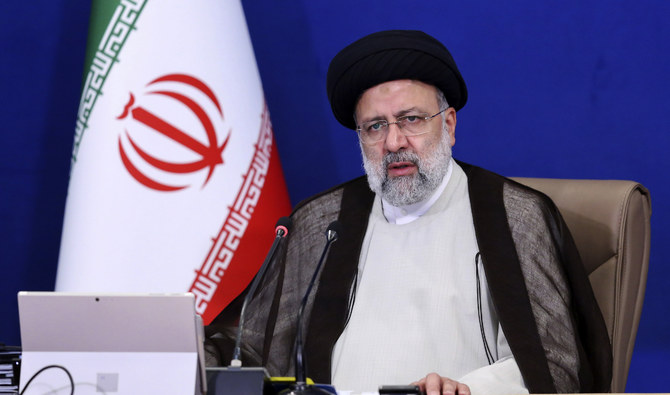CHICAGO: At a summit organized by the National Council of Resistance of Iran, several former members of the US Congress endorsed calls for the prosecution of Iranian President Ebrahim Raisi for “crimes against humanity and genocide,” over his role in the 1988 massacre of 30,000 political prisoners.
Raisi was sworn-in as president of Iran in August and has packed his cabinet with senior figures from of Islamic Revolutionary Guard Corps, many of whom have been accused of human rights violations and war crimes. NCRI officials said that of 19 cabinet members, about two-thirds are veterans of the IRGC, which has been declared a terrorist organization by the US.
Former US Vice President Mike Pence joined former senators Joseph Lieberman and Robert Torricelli, former Attorney General Michael Mukasey and retired Gen. James Conway in demanding that Raisi be prosecuted.
“The recent selection of Ebrahim Raisi to serve as Iran’s president is a sign of the regime’s growing weakness and desperation,” Pence told the crowd of nearly a thousand at the summit, which took place in the Grand Ballroom at the Washington Hilton and was attended by Arab News.
“His selection as president is intended to quash internal dissent and intimidate the people of Iran into remaining silent. But we must never remain silent in the face of evil. Many people attending today know well just how evil Raisi is.”
Pence defended the actions taken by former President Donald Trump to prevent Iran from developing nuclear weapons, and criticized President Joseph Biden’s “re-embrace of the JCPOA (the Joint Comprehensive Plan of Action, also known as the Iran nuclear deal), the abandonment of our ally Israel, and the disastrous withdrawal from Afghanistan.”
Pence said that Biden’s actions have emboldened Iran to expand its terrorist attacks through proxy groups such as the Houthis in Yemen and others in Iraq, Syria and Lebanon.
Mariam Rajavi, the president-elect of the NCRI, opened the summit by decrying Tehran’s attempts to develop nuclear weapons, its weaponizing of drones for terror strikes, and its funding of terrorism throughout the region.
“It is time for the international community to side with the people of Iran and their desire for change,” she said. “The Iranian people have clearly demonstrated their demands and resolve for change. They reject the regime in its entirety.
“The people of Iran call on governments, including the US and European governments, to revise their policies on Iran and side with the Iranian people. On the nuclear issue, it is time to abandon the policy of ignoring the regime’s violations.”
Rajavi also called on the UN to revive and enforce previous resolutions that called for Iranian officials, including the president, to be held accountable for their actions.
“The people of Iran expect the international community to prosecute Ebrahim Raisi for genocide and crimes against humanity in an international court,” she said. “He is a mass murderer and he must be prosecuted now and not later.”
In the summer of 1988, the Iranian regime carried out secret mass executions of 30,000 political prisoners, 90 percent of whom belonged to the main Iranian opposition group, the Mujahedin-e-Khalq. Raisi was a member of “death commission” responsible for carrying out the massacre, NCRI officials said.
In December 2018, Amnesty International issued a comprehensive report that declared the 1988 massacre an “ongoing crime against humanity.” In the 117th US Congress, House Resolution 118, which had 250 co-sponsors, also described the massacre as “a crime against humanity” and demanded accountability.
Following his election as president, Biden reopened negotiations with Iran on rejoining the 2015 JCPOA. The agreement between Iran, the US and other foreign powers placed limits on Iran’s nuclear program in exchange for sanctions relief. In 2018, Trump withdrew from the deal and restored sanctions.
NCRI leaders and their allies argue that Tehran is using the JCPOA negotiations as a cover and distraction while it continues its efforts to develop a nuclear weapon.
US political figures call for prosecution of Iranian president for crimes against humanity
https://arab.news/54ypd
US political figures call for prosecution of Iranian president for crimes against humanity

- Former vice president Mike Pence tells summit in Washington: ‘We must never remain silent in the face of evil. Many people attending today know well just how evil Ebrahim Raisi is’
- National Council of Resistance of Iran’s president-elect said: ‘It is time for the international community to side with the people of Iran and their desire for change
Israel army issues new evacuation warnings in Lebanon

JERUSALEM: The Israeli military issued new evacuation orders for dozens of locations in Lebanon on Tuesday, including a warning for residents in two southern Beirut neighborhoods to stay away from several buildings ahead of imminent military action.
“Urgent warning to the residents of Lebanon, specifically in the villages which names are shown. For your safety you must evacuate your homes immediately,” said a statement by the military’s Arabic-language spokesman Avichay Adraee on Telegram, which listed 50 locations.
Many of the locations were across the south of Lebanon, which Israel regularly targets with the aim of hitting Hezbollah infrastructure.
“You are located near Hezbollah facilities and interests, against which the IDF will operate in the near future,” he told the residents of southern Beirut neighborhoods Ghobeiry and Haret Hreik in another evacuation warning.
Lebanon’s government on Monday took the unprecedented step of banning Hezbollah’s military and security activity, prompting the Iran-backed group to lash out at the decision.
Hezbollah is represented in both the government and parliament, and the move came hours after it announced it had launched rockets and drones toward Israel early Monday to avenge the killing of Iranian supreme leader Ali Khamenei in US-Israeli attacks.
Israel bombarded Beirut’s southern suburbs and dozens of villages in south Lebanon on Monday in response, vowing to make the group pay a “heavy price.”
The Lebanese health ministry said the strikes killed at least 31 people and wounded at least 149.














